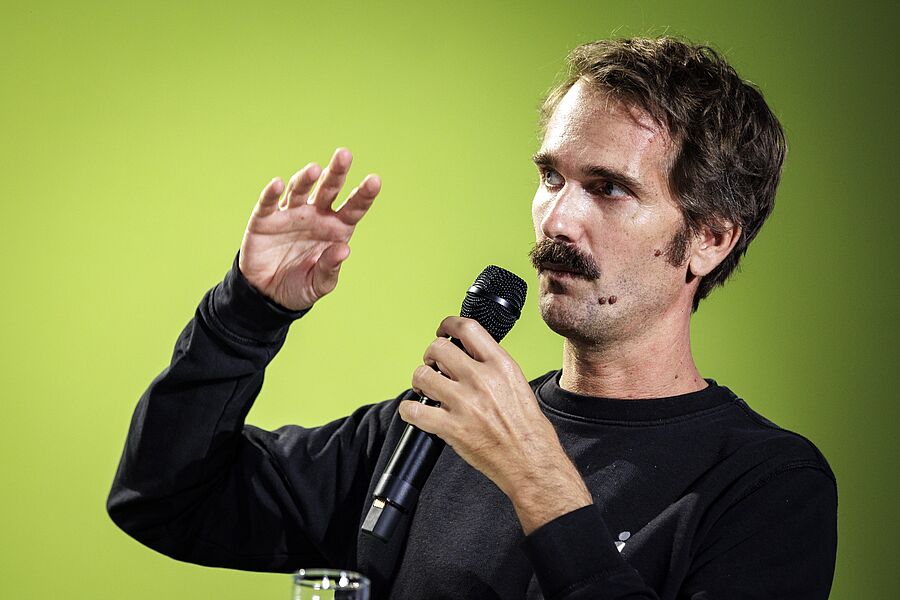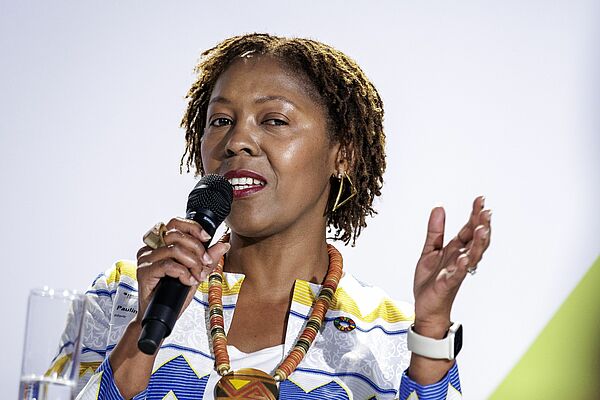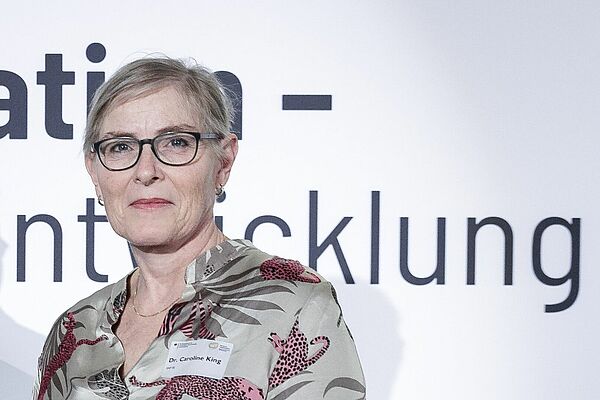Paul Bethke, entrepreneur: changing the world, drop by drop

Paul Bethke visited Sri Lanka for the first time while he was still at school. During his stay, he had the idea of founding a company that would support disadvantaged regions. This desire grew into the company Lemonaid Beverages GmbH, which today supplies the gastronomy sector and supermarkets all over the world with sparkling soft drinks and ice teas. Lemonaid buys the ingredients for its products directly from countries in the Global South and supports social projects locally where the suppliers are based. But building the company has not always been smooth sailing. Paul Bethke is part of ‘Team Transformation’, a group of five pioneering thinkers committed to promoting sustainable and fair economic and business practices through the programmes of the Partners in Transformation.
In 2018, Lemonaid Beverages GmbH, the company founded by entrepreneurs Paul Bethke and Felix Langguth, had already been on the market for almost ten years. Business was going well and sales were increasing . Until someone noticed that the drinks did not contain enough sugar. Then Lemonaid received a legal warning from the Hamburg office for consumer protection. The problem was that their ‘Lemonaid’ drinks only contained 5.5 per cent sugar instead of the mandatory 7 per cent, and therefore could not be sold under the German term ‘Limonade’. This might sound trivial, but it was a major problem for the entrepreneurs. ‘We would have had to refill our products in bottles marked differently, which would have been difficult because labels have to specially incinerated , which is why we print directly onto the bottles. Ultimately, we would have had to take the products off the market, and it could have put us out of business,’ recounts Paul Bethke. The Hamburg company decided to fight the case in court. A short while later, the consumer protection office rescinded the warning notice. In May 2024, the German Food Code Commission officially repealed the regulation that ‘Limonade’ has to contain seven per cent sugar.
This incident is now just a curious footnote in the company’s eventful history. Lemonaid Beverages has established itself on the market, employs 125 people, and supplies between 35 and 38 million bottles of soft drinks every year to supermarkets, cafés, bars and restaurants. The idea is that the company sells low-sugar soft drinks, for which it purchases the raw materials directly from countries in the Global South. At the same time, the Lemonaid & ChariTea Foundation supports public-benefit projects. What does it take to set up a social enterprise like this? The answer is closely linked to the biography of one of its founders, Paul Bethke.
Love-struck in Sri Lanka
In 1997, a young Paul went abroad as a 15-year-old schoolboy. ‘My head was full of questions about how life worked. So I wanted to see the world.’ Contacts of his mother, a primary school teacher, enabled him to visit Sri Lanka and attend the British School in Colombo. ‘Back then, it wasn’t the dream holiday destination we think of today,’ Bethke recalls. Until 2009, there was civil war in Sri Lanka, particularly in the north and east of the country. But despite this, Bethke fell in love with Sri Lanka, and still has ties to the country today. He spends more than half the year there, and his three children were also born there. ‘Here in Sri Lanka, people have a relaxed attitude, a kind of bird’s eye view of life.’ When he first came here at the age of 15, his family expected him to feel homesick after a few months. Instead, he stayed on the island until his school-leaving exam. After completing his school education, Bethke went to university at various places including Edinburgh – unlike some of his Sri Lankan schoolmates. ‘Some of the pupils in my class were much better than me, but they couldn’t go to university. That got me thinking.’
After he finished studying economics and psychology, ensuring distributive justice and overcoming obstacles became his goal. He initially returned to Sri Lanka as a project coordinator in 2006, where he helped to rebuild the country following the tsunami disaster two years before. ‘But I actually wanted to do more than just hand out money; I wanted it to be money I had earned myself.’ This sparked the desire to set up a social enterprise. Together with Felix Langguth, a fellow student from this university days, Bethke got to work. ‘We were perhaps a bit naive in the beginning,’ Bethke says, looking back.
Founding a company during the financial crisis
The pair founded their company in the middle of the financial crisis. The recipes for the soft drinks were created in Bethke’s kitchen in Hamburg. But getting the drinks from there into the supermarkets turned out to be a challenge. ‘We thought, we’ve got a great idea, we want to sell soft drinks and support projects. The banks all shook their heads and said they were busy with very different problems.’ Besides financing, Bethke and Langguth faced some very practical hurdles because no one wanted to – or was even able to – bottle their drinks and make the products on a large scale. ‘In Germany, lemonade is generally produced from syrup. Syrup is mixed with water and sold as lemonade. The bottling plants are designed to do exactly that. However if, like us, you come along and say, “I have loose tea and I want to use it to make ice tea,” then all the manufacturers throw up their hands.’ Bethke and Langguth talked to hundreds of bottlers but nobody could help them. That was until one manufacturer suggested, ‘I don’t have the right facilities either – but I’ll build them with you.’
Too public-spirited
After the initial problems had been resolved, business took off. Bethke and Langguth seemed to have caught the mood of the market and sold more and more bottles, contributing to an ever-wider range of drinks in supermarkets. Bethke was awarded the Deutscher Gründerpreis (German Founder’s Award) for his company in 2016. At the same time, increasing sales were benefiting more and more projects through Lemonaid & ChariTea e.V. All round the world. Today, the foundation supports 36 local initiatives in Africa, South America and Asia. But the ground-breaking nature of the project was evident in the reaction of the authorities. In 2021, three years after the legal order from Hamburg’s consumer protection office, the next legal dispute began – and is still ongoing.
This time, it was the tax office finding fault with Lemonaid Beverages. In the view of the tax office, the firm had made payments ‘without receiving any consideration’. ‘So the tax office is saying that supporting a public-benefit project has no entrepreneurial value. It’s OK to support a car racing team, but the tax office says there’s no value in helping people in difficult situations. This is a debate in which I will gladly explain my point of view,’ says Bethke. He and Langguth had made a conscious decision to use a sponsoring model instead of donating. The problem with donations is that, under German law, only 0.4 per cent of a company’s revenue may be given to an independent, public-benefit association. This is not nearly enough. Lemonaid Beverages currently gives many times that amount. This year, the two sides will meet to dispute the matter in the Finance Court.
Next stop: Madagascar
Bethke believes his company will win the legal dispute. ‘One reason customers buy our products is because they know that, in doing so, they are supporting a good cause.’ The sponsoring is therefore an investment in the firm’s own credibility. In 2021, the Parliamentary Advisory Council on Sustainable Development of the German Bundestag asked Bethke how social enterprises in Germany could be strengthened and he gave a presentation on the topic. ‘If strengthening social enterprises really is a public issue, then the value they create must also be recognised.’
In spite of everything, Bethke still is looking to the future, and in particular to Madagascar, the latest country to receive support from Lemonaid. A number of new projects, such as small loans for entrepreneurs, have just been launched to foster the economic independence of the people there. Furthermore, Lemonaid is set to make some changes to its packaging and its product portfolio. But who knows what the future will bring? Only a relaxed Sri Lankan attitude will help.
Published on

